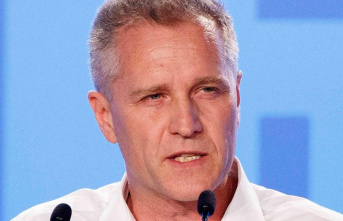There is little doubt about the Supreme Court's plans regarding Roe v. Wade. As the court closes in on a final opinion, uncertainty surrounds ripple effects that could be caused by the 1973 landmark case which established a national right to abortion.
The Supreme Court authenticated Tuesday's first draft of the majority opinion in this case. It suggests that the majority of justices are ready to throw out Roe. Provocative rhetoric in the draft is raising concerns that LGTBQ advances, and other matters based upon privacy rights, could be compromised in a hostile political environment.
"This is more than abortion," President Joe Biden warned Wednesday. He said that the draft opinion by the court could threaten same-sex marriages, contraception access, and LGBTQ rights.
"What are the next targets? Biden stated that the MAGA crowd was "the most extreme political group in American history,"
The drafting process can lead to changes in court opinions. Although the final ruling in the abortion case seems certain, the written rationale and its implications may be hotly debated inside the court's private chambers.
The potential impact of the draft's broad reach could be mitigated by other justices or it could remain largely unchanged -- with what advocates say could have even more serious consequences.
Justice Samuel Alito, who is a member the court's conservative 6-3 majority, wrote the draft opinion. He argued that unnumerated constitutional rights, which are not specifically mentioned in the document, must be "deeply embedded in the Nation’s history and traditions." It also states that abortion does not meet that standard.
Biden and other advocates are voicing concern that this logic could be used for other protections.
According to the president, he believes that the conservative justices of today's court, like Robert Bork, a failed Supreme Court nominee, would disagree with the court’s decision in Griswold v. Connecticut. This case ruled that there is a right-to-privacy that prohibits states from interfering with married couples' rights to use and buy contraceptives.
Lawrence v. Texas which overturned sodomy laws that criminalize same-sex intimacy and Obergefell V. Hodges which legalized gay marriage are both based at least partially on the same right to privacy.
In the draft opinion Alito explicitly stated that the court only targets the right to abort, and not other matters.
The draft states that "We stress that our decision concerns constitutional right to abortion" "This opinion does not cast doubt on precedents which do not pertain to abortion.
Obergefell differs from Roe in the fact that hundreds of thousands of identical-sex couples have used it to wed, and to create legal bonds like shared property and inheritance rights, and "settled their expectations about the future," Teresa Collett, a professor of law at the University of St. Thomas School of Law, and director of its Prolife Center.
This kind of precedent is often not upheld by courts. Collett stated that this contrasts with abortion which is often "a response to unplanned situations".
Obergefell also relies on the Constitution’s Equal Protection Clause and the right to privacy.
This Supreme Court case relates to a Mississippi law banning abortion after 15 weeks. It was passed before the "viability standard" established in Planned Parenthood, v. Casey. That case also went beyond Roe's original trimester framework to regulate abortion.
All six conservative justices indicated that they would support the Mississippi law during December arguments. Five asked questions suggesting that they were in favor of overturning the right for abortion nationwide. The issue is left up to the individual states.
Only Chief Justice John Roberts appeared willing to make the small step of upholding the ban for 15 weeks, effectively overturning Casey's decision and preserving Roe's right to abortion.
The court has permitted states to regulate, but not ban, abortion until now. This is approximately 24 weeks. Three liberal justices on the court appeared to be in dissension.
Jason Pierceson, a professor of political science at University of Illinois Springfield, stated that Alito's overall language and tone could lead to more problems. Pierceson stated that if the right to privacy is undermined or smashed out, or minimized, those cases will have less standing.
The high court could challenge same-sex married couples on religious liberty grounds. For example, someone who claims that their religion prohibits them from recognizing same-sex marital relationships might do so. Pierceson stated that cases along these lines are mainly about the exceptions to antidiscrimination laws. However, Pierceson suggested that there could be a widening of the argument to include the possibility that same-sex marriage laws may not be constitutional in the first instance.
The past decade has seen rapid progress in LGBTQ rights and the public's support for them has increased. In the last year, there have been many bills in state legislatures that target transgender youth sports and health care. It also allows for discussion about LGBTQ issues in some classrooms. These bills are supported by parents and children as well as their rights.
According to Sharon McGowan (legal director at Lambda Legal), the draft opinion could be "flare" to conservative activists if it is finalized.
She stated that "Overturning Roe is most dangerous because it will send lower court to disregard all other precedents that exist."
It all started with abortion. Mini Timmaraju, president of NARAL Pro-Choice America, said that it's not over with abortion. "So everyone must be extremely vigilant."
Critics can also learn from the anti-abortion strategy, which included multiple measures over the years that dealt with the issue from different angles. It imposed limits instead of sweeping prohibitions, and used unusual strategies such as the civil-enforcement system that has already allowed Texas to ban abortion. Alison Gash is a professor at University of Oregon.
She said, "It opens up the door to all sorts of stuff which I think we're likely to see now that our court seems willing to support this kind of creativity." It's speculation at best, but it seems plausible that we could see Republican experimentation with a bunch of policies that could potentially be affected by this."
Donna Lieberman is the executive director of New York Civil Liberties Union. She stated that "what comes across loud and clear in this draft is that the agenda" "is not just about getting rid of abortion, but to ban contraception and to eliminate all of the important progress we've made regarding LGBTQ rights, the rights of trans kids, and about racial equality."












